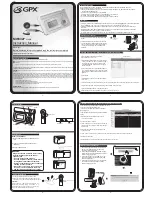
LEAKAGE CURRENT HOT CHECK / (See
Figure 1
.)
1. Plug the AC cord directly into the AC outlet. Do not use an isolation
transformer for this check.
2. Connect a 1.5 k , 10 W resistor, in parallel with a 0.15 F capacitor,
between each exposed metallic part on the set and a good earth
ground, as shown in
Figure 1
.
3. Use an AC voltmeter, with 1 k /V or more sensitivity, to measure the
potential across the resistor.
4. Check each exposed metallic part, and measure the voltage at each
point.
5. Reverse the AC plug in the AC outlet and repeat each of the above
measurements.
6. The potential at any point should not exceed 0.75 V RMS.
A leakage current tester (Simpson Model 229 or equivalent) may be
used to make the hot checks. Leakage current must not exceed 1/2
mA. In case a measurement is outside of the limits specified, there is a
possibility of a shock hazard, andthe equipment should be repaired
and rechecked before it is returned to the customer.
Figure 1
1.1. LASER PRODUCT
CLASS I LASER PRODUCT
- This equipment is certified to comply with DHHS Rules 21 CFR Chapter
1, Subchapter J in effect as of date of manufacture. (Only for U.S.A.)
This equipment is classified as a Class I (Class 1) level LASER Product and there is no hazardous
LASER radiation with the safety protection.
Caution:
4
Summary of Contents for DoubleFeature PV-D4734S
Page 2: ...2 ...
Page 19: ...CAUTION Disconnect AC plug before disassembly or assembly Fig C2 19 ...
Page 23: ...Fig D1 Fig D2 23 ...
Page 27: ...9 2 DVD SECTION 27 ...
Page 28: ...9 3 CHASSIS FRAME AND CASING PARTS SECTION 28 ...
Page 29: ...9 4 PACKING PARTS AND ACCESSORIES SECTION 29 ...
Page 44: ...44 ...
Page 46: ...46 ...
Page 48: ...48 ...
Page 53: ...53 ...
Page 55: ...55 ...
Page 67: ...67 ...
Page 69: ...69 ...
Page 71: ...71 ...
Page 73: ...73 ...
Page 78: ...78 ...
Page 80: ...80 ...
Page 87: ...87 ...
Page 95: ...95 ...
Page 96: ...12 SCHEMATIC DIAGRAMS FOR PRINTING WITH LETTER SIZE 96 ...





































